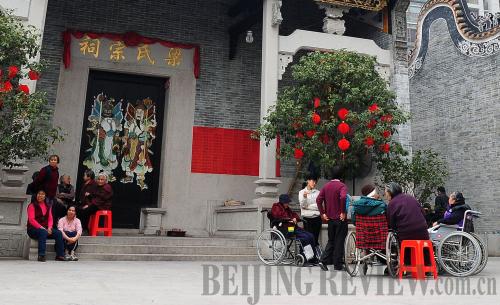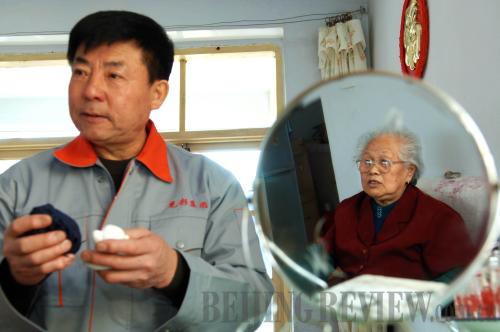|
|

|

|
|
A HAPPY, ELDERLY LIFE: Senior citizens in a village near Guangzhou, Guangdong Province, chat at the gate of their family's ancestral temple (LU HANXIN) |
PENSIONS: A resident in Jinan, Shandong Province, shows her bankbook. In April, 600,000 seniors in Jinan began drawing pension payments from their accounts (XU SUHUI) |
|

|

|
|
CARING FOR SENIORS: A housekeeper in Yantai, Shandong Province, talks to an elderly woman while he cleans her house (GUO XULEI) |
PLANNING FOR PENSIONS: Residents of Tancheng County, Shandong Province, fill out paperwork to join pension programs on June 2, 2011 (ZHANG CHUNLEI) |
According to the newly launched pension program, pensions for unemployed urban residents also come from their own contributions and government subsidies. With the launch of the new program on July 1, unemployed urban residents aged 60 or older do not need to make personal contributions and can receive a basic pension of 55 yuan ($8.5) a month. Those aged between 45 and 60 must have paid into their personal accounts for no more than 15 years, while those under 45 must pay for at least 15 years.
Participants in the new pension program have 10 contribution options to choose from, ranging from 100 yuan ($15.4) to 1,000 yuan ($154) a year. The more they pay, the more they can get in return after turning 60 when they start to receive basic monthly pension payments of 55 yuan ($8.5) in addition to any payments they made to their own accounts.
Meanwhile, local governments are also required to give subsidies of at least 30 yuan ($4.6) a year to each program participant. Local governments must also pay part or all of the minimum annual sum of 100 yuan ($15.4) into the program for seriously disabled people. Other economic and social organizations, as well as individuals, are encouraged to contribute, with all personal contributions and subsidies going toward the individual accounts of participants.
The Social Security Fund (SSF) also plays a significant role in addressing the country's growing pension needs. The fund, managed by the Central Government, obtains capital from the central budget, lottery ticket sales and returns on investments, as well as share transfers of state-owned enterprises. Established in August 2000, the SSF is expected to help meet the future pension and social welfare needs of China's aging population, and also contribute to relief efforts for natural disasters. The total assets of the SSF reached 856.8 billion yuan ($131.8 billion) in 2010, up 10.32 percent year on year, said Dai Xianglong, Chairman of the National Council for Social Security Fund.
One of the many challenges facing China today is how to deal with a population that is growing older faster than it is becoming wealthy, said Cai Fang, Director of the Institute of Population and Labor Economics under the CASS. This has put mounting pressure on the government's fiscal capacities as pension programs expand and become more demanding, he said.
Enough to live?
Unemployed urban residents covered by the new program will receive a basic monthly pension of at least 55 yuan ($8.5) and pensions from a life-long individual account. Local governments can raise the standard of the basic monthly pension according to their local conditions and the standard can also be raised for long-term depositors.
Under the rural pension program, the basic pension of farmers is also 55 yuan ($8.5) per month. The amount is alarmingly low given the country's booming economy. It is also one that is far from enough to afford even the most basic of lifestyles.
"It is true that the basic pension of 55 yuan ($8.5) is too low," said Wang Ying, a researcher with the Shanghai-based CBN Research. "Suspicions also abounded with the government's tolerance of laziness of the unemployed urban residents."
"But most importantly, with the new program China can provide pension coverage for its 1.3 billion citizens," she said.
Results from the country's latest national census showed that around 119 million Chinese people were older than 65, accounting for 8.87 percent of the total population.
China's aging society has posed a tough test for the country's social safety net and placed an onus on the Central Government to further optimize its pension programs, said Wang.
|
